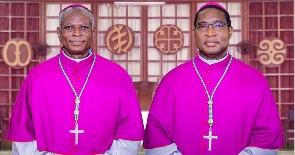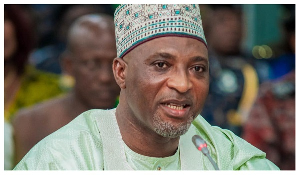The leader of the Catholic Church, the Holy Father Pope Francis, on February 14, 2023, appointed two Auxiliary Bishops for the Archdiocese of Accra.
The appointees are Rev. Fr. John Kobina Louis and Rev. Fr. Anthony Narh Asare, who has been assigned the Titular See of Castelloin Numidia, an ancient Diocese which is located in present-day Algeria.
The two catholic priests are expected to be ordained into their new roles, on Wednesdays, April 19, 2023, at an Episcopal Ordination at the Holy Spirit Cathedral in Accra.
Rev. Fr. Anthony Narh Asare, till his appointment as an auxiliary bishop, was the Parish Priest of St. Anne and Joachim Catholic Church and Director of Priest Personnel of the Accra Archdiocese.
Rev. Fr. John Kobina Louis was the Vicar General of the Accra Archdiocese, a position he has held since 2019.
What is the difference between an Auxiliary Bishop and a Bishop?
Both Archbishops and Auxillary Bishops are called and consecrated to the fullness of the priesthood of Jesus Christ. Thus, there is no difference in the ordination of an Auxiliary Bishop, Diocesan Bishop, archbishop and even a Cardinal. Indeed, the Pope himself is not “ordained” a Pope. He, too, is a Bishop, in fact, the Bishop of Rome.
The difference between an Auxiliary Bishop and the Diocesan Bishop of the same Diocese is in the governing rights of the particular church. The Diocesan Bishop as the ordinary of the diocese exercises ordinary powers. Ordinary power or jurisdiction is one which is committed to a particular office by law in such a way that anyone who occupies the office automatically possesses that authority. Ordinary jurisdiction is held in the canon law of the Catholic Church to be the jurisdiction “permanently and irremovably annexed to” the office of the diocesan bishop.
Auxiliaries are nominated upon the request of the Diocesan Bishop, their roles may differ depending on the Diocese and the Diocesan Bishop, but in general, Auxiliary Bishops may assist with confirmations, baptisms, ordinations and special Masses, or even in the regional governance of a particular part of the Diocese.
Watch the latest episode of People and Places below:


IB/DA
Religion of Tuesday, 18 April 2023
Source: www.ghanaweb.com



















